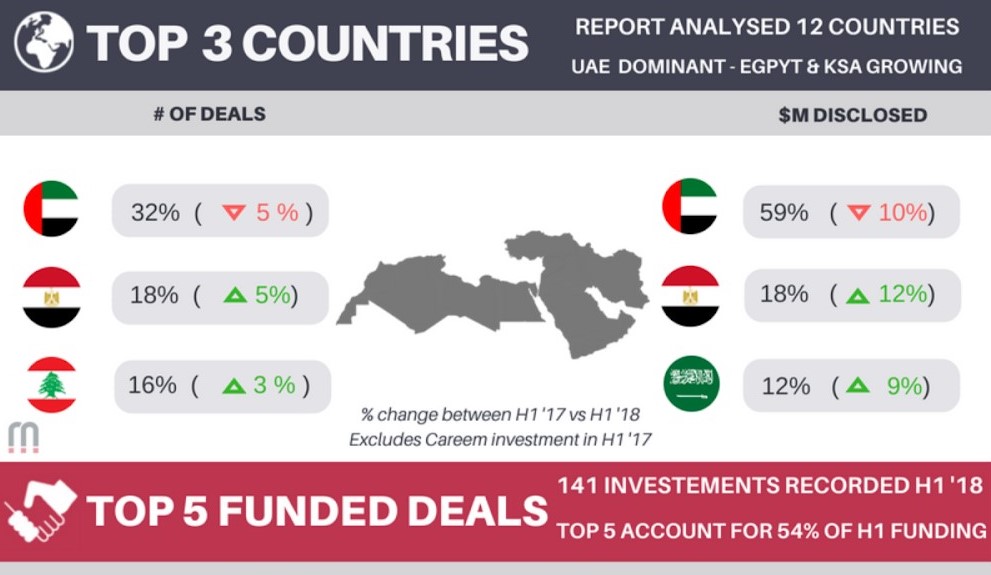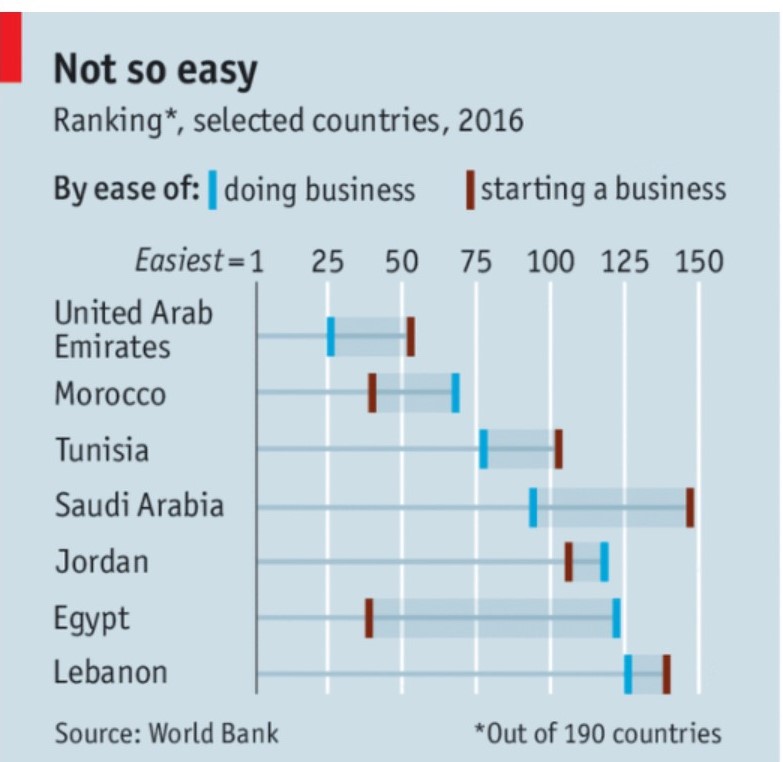The startup business scene in the Middle East and North African (MENA) region is vibrant and innovative, but it is also sometimes labelled with misconceptions and stereotypes. So, if you possess some false accusations and fallacy about the Arab startup business scene, we’re about to change them.
The Middle East’s startup ecosystem is booming: 2018 saw a record number of 366 startup deals take place across MENA, amounting to $893m of total investment
The startup business scene in the MENA region is in the process of growing and maturing. Entrepreneurs there are hoping that the stereotypes will fade, or at least evolve.
In this article we shed a light on the growth in the startup business scene in the MENA region in the last couple of years. We also focus on examples of successful startups who were able to succeed despite all the obstacles they faced.
Background of the startup business scene
There are 22 Arab states in MENA region, with a total population of 423 million people. Individuals are inclined to start their own business in the region for various reasons. Such as: more income, greater independence, following their passion, control their career path or getting a better work-life balance. Moreover, entrepreneurs in the region benefit from a market characterized with high levels of smartphone penetration, internet usage, trading power and the presence of a small number of market-dominating corporates and the lack of monopolies.
The major concerns that face entrepreneurs in the region vary. Among procuring finances to start is hiring the wrong people, uncertainty of profit and the possibility that their business idea not being accepted by the customers.
According to Statista, fintech and e-commerce are the leading startup industries in the MENA and the majority of fintech start-ups are based in the Gulf region. They’re followed by Transport & Delivery, which were the third most popular industry in terms total deals in 2018. This prosperous environment and ecosystem deserves attention and provides a perfect opportunity for disruption.
Related: You can read the success story of an entrepreneur who started his software development company that started in a MENA country and now expanded worldwide.
Breaking down the hurdles
Youth are particularly taken away by major success stories like Mark Zuckerberg, Steve Jobs and college dropouts. Those who started from their garage and made a million-dollar business. They are initially inspired and eager to launch their own startup business themselves. They have high hopes that one day they’ll be as successful. But when it’s time for a reality check, they face dozens of obstacles and deprivations that they weren’t prepared for.
Yet, the startup ecosystem in the MENA region has massively improved over the past couple of years. Governments are particularly keen to see the startup sector expand. This will help them settle the dilemma of high levels of unemployment among their youth population.
155+ institutions invested in MENA startups in 2018, 30% from outside the region and 47% had not previously invested in the region.
MENA governments are establishing many supportive and regulatory entities, by launching different programs to help the startups.
- Dubai’s Department of Economic Development Business Initiatives: It provides a supportive environment for creativity and excellence, as well as attracting local and foreign businesses. They aim to be as supportive as possible for startups to get them up and running and help them on their way to success.
- Dubai Chamber’s Startup Hub: A semi-government initiative. Their main purpose is to provide clarity and direction in the journey of a startup entrepreneur.They collaborate with experienced & trusted partners to provide information that answers all essential entrepreneurial questions.
- Smart Dubai (Startup Support): Smart Dubai and partners in the UAE government are committed to transform the UAE into the new testbed for startups and entrepreneurs to innovate and scale emerging technologies. In the past two years they have launched and continue to operate several programs to assist startups.
- Egypt Ventures: An investment firm focused on empowering the entrepreneurial ecosystem by investing in venture capital firms, accelerators and high growth enterprises. Furthermore, the initiative runs a four-month acceleration program by Falak Startups Accelerator that offers funding, office space, and mentor-ship to the early-stage startups.
- TAQADAM Startup Accelerator: The King Abdullah University of Science and Technology (KAUST) is hatching different technologies. In partnership with the Saudi British Bank. TAQADAM helps aspiring entrepreneurs bring their ideas to market through mentor-ship and training over the course of 6 months.
Successful homegrown ideas

We’ll start with Ameer Sherif - Wuzzuf’s CEO – words:
“I would definitely advice entrepreneurs to focus on building SaaS (Software as a Service) for small businesses or marketplace platforms. With enough focus on building a great product, you can build a great business. In all cases, build something worth using… and persevere.”
The homegrown entrepreneurs in Middle East have started listening to the user’s requirements and implement them. The homegrown ecosystem is spreading its wings to cover startup business ideas in different fields. Such as – travel, hotel management, beauty salon, taxi, delivery, etc. With further development in technology, the startup ecosystem will tend to continue maturing and growing.
As a source of inspiration, we’ve listed below some of the top successful startup businesses in the MENA region:
- BonApp: Offers a simple and innovative solution to one of the world’s largest environmental issues, food waste in the F&B industry. The app helps restaurants reduce their food waste by selling their surplus to consumers at discounted prices.
- Anghami: A mobile application that streams free legal music. It also offers the opportunity for users to listen to unlimited Arabic and international songs.
- Seven Dynamic: A software development company that helps you get your company online and out for the world. They also provide their clients with the latest in Web Application Technology, Mobile Application Development (iOS and Android), CRM, ERP and FPI Development.
- Instaglam: An app for on demand beauty services. They connect beauty professionals and customers anywhere, anytime and at any budget.
- Eventtus: An award-winning web platform and mobile app for events planning, networking and ticketing.
- Premium Plus: An advertising agency specializes in branding, printing and digital marketing.
- Jamalon: The largest online bookstore in the Middle East, offering more than 9.5 million titles of Arabic and English books ready for home delivery.
- Instabug: Provides in-app feedback and bug reporting to mobile apps. It provides a seamless way for two-way communication with users, while providing detailed environment report for developers.
The answer to the question “Is the startup business growing in the MENA region?” is definitely yes. The ecosystem is thriving and so are the Arab entrepreneurs. This growing momentum will undoubtedly be channeled towards accelerating the rise of more startups in MENA.








